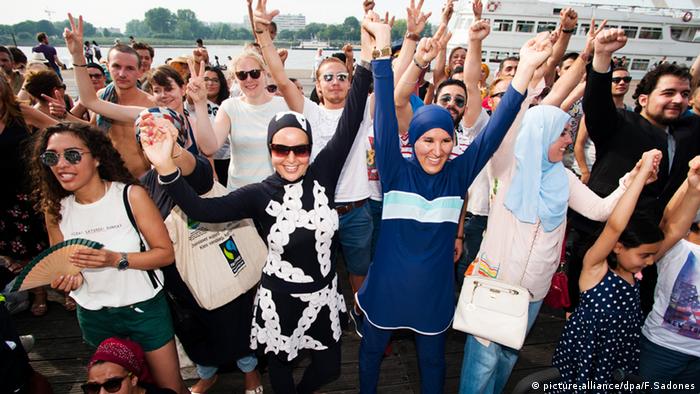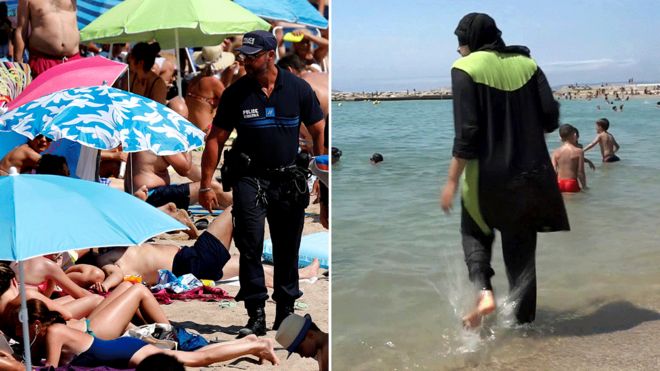Burkini Storm on Sandy Beaches
"I own a burkini and I love it. I am a practising Muslim, and I believe there should be a choice. I honestly don't like exposing my body in public, and I like to work fashion into my preferences on how I wish to clothe myself."
"A big part of being in a modern society, part of living in freedom, is allowing people to live their life how they want to live it. By putting forward this ban [the mayor of Cannes] is infringing upon a human's basic right to live how they wish to."
"It's not the responsibility of a public servant to dictate how I choose to cover my body."
Sabrina Akram, Pakistani-born U.S. citizen
 |
"I don't have a burkini, but I do swim wearing a headscarf, tracksuit bottoms and long T-shirt. I think [the ban is] slightly ridiculous. In Victorian times swimmers would wear long baggy trousers, full tops and swimming caps and no-one blinked an eye!"
"I fail to see how a woman wishing to cover her body with a particular style of costume whilst swimming can possibly be a symbol of Islamic extremism."
"I accept that there are some horrendously psychotic people out there proclaiming to be fighting on behalf of one group or another. However, what a woman chooses to wear on a public beach is not going to make the slightest bit of difference, and just hands ammunition to those who want to... recruit to their twisted ideology."
Kerry Amr, Muslim convert, Telford, England
"This decision [France's administrative court overturning burkini ban], far from pacifying, will serve only to heighten tensions, which will carry risks of trouble which we wanted to avoid."
"Rampant Islamism has been gaining ground. With this ruling it has gained some more."
Lionnel Luca, mayor, Villeneuve-Loubet, France
 |
| Muslim women in Belgium organized a different kind of protest. They gathered in Antwerp to celebrate at a beach party, dressed in burkinis, bikinis or bathing suits. Their motto was: "We are women and we are free." |
Something about the totalitarianism of Islam's ideology that insists its faithful must subscribe to a total package of lifestyle, law, faith, politics unquestioningly, particularly with the resurgence of extreme Islam now dominating the religious culture which sees young Muslim women whose mothers and grandmothers wore western-style clothing sans hijab, let alone niqab and burka only decades earlier, now choosing to appear more fashionably discreet, spurning the opportunity to be relaxed about their clothing in favour of chaste cover-ups.
And so the burkini was born, an ostensible cover-up, permitting only hands, feet and face to glow in the sun. Leggings, hair covering, long-sleeved shirt and shift seem to these women more appropriate to their status as Muslim women in an ever-increasing move toward separating themselves from the loose ways and tight garments of their non-Muslim counterparts. Strange this is, since it appears to be non-Muslim men who are affronted at the spectacle of Muslim cover-ups.
 |
|
|
Where women are completely water-drenched wearing full cover tops with the result being a totally revealing body shape. So what happens when a burkini is completely soaked? It melds to the form of the wearer in the most faithful way, showing off all her curves and bulges. How is this in any way modest? The only difference between that and the bikini is that skin shows in one, and the clinging outlines in the other and the rest is left to the fertile imagination of the onlooker.
It has been proven time and time again that it is more seductive and enticing when a woman covers herself suggestively, than when she uncovers herself and allows all to be revealed. This latest insistence of Muslim women that a burkini defines their sense of security and modesty as a vulnerable woman is simply a game of show-and-tease and everyone should just get over it.

<< Home